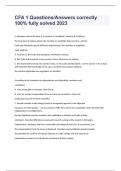CFA 1 Questions/Answers correctly
100% fully solved 2023
In situations where the laws of a member or candidate's country of residence,
the local laws of regions where the member or candidate does business, and the
Code and Standards specify different requirements, the member or candidate
must abide by:
A. local law or the Code and Standards, whichever is stricter.
B. the Code and Standards or his country's laws, whichever are stricter.
C. the strictest of local law, his country's laws, or the Code and Standards - correct answer C To comply
with Standard I(A) Knowledge of the Law, a member must always abide by
the strictest applicable law, regulation, or standard.
According to the Standard on independence and objectivity, members and
candidates:
A. may accept gifts or bonuses from clients.
B. may not accept compensation from an issuer of securities in return for
producing research on those securities.
C. should consider credit ratings issued by recognized agencies to be objective
measures of credit quality. - correct answer A Gifts from clients are acceptable under Standard I(B)
Independence and Objectivity,
but the Standard requires members and candidates to disclose such gifts to their
employers. Standard I(B) allows issuerpaid research as long as the analysis is thorough,
independent, unbiased, and has a reasonable and adequate basis for its conclwions, and
the compensation from the issuer is disclosed. Members and candidates should consider
the potential for conflicts of interest inherent in credit ratings and may need to do
independent research to evaluate the soundness of these ratings.
,Bill Cooper finds a table of historical bond yields on the website of the U.S.
Treasury that supports the work he has done in his analysis and includes the
table as part of his report without citing the source. Has Cooper violated the
Code and Standards?
A. Yes, because he did not cite the source of the table.
B. Yes, because he did not verify the accuracy of the information.
C. No, because the table is from a recognized source of financial or statistical
data. - correct answer C According to Standard I(C) Misrepresentation, members and candidates must
cite the
sources of the information they we in their analysis, unless the information is factual
data (as opposed to analysis or opinion) from a recognized financial or statistical
reporting service. The U.S. Treasury is one example of a recognized source of factual
data.
Which of the following statements about the Standard on misconduct is most
accurate?
s.
A. Misconduct applies only to a member or candidate's professional activities.
B. Neglecting to perform due diligence when required is an example of
misconduct.
C. A member or candidate commits misconduct by engaging in any illegal
activity. - correct answer B Failing to act when required by one's professional obligations, such as
neglecting to
perform due diligence related to an investment recommendation, violates Standard I(D)
Misconduct. Acts a member commits outside his professional capacity are misconduct
if they reflect poorly on the member or candidate's honesty, integrity, or competence
(e.g., theft or fraud).Violations of the law that do not reflect on the member or
candidate's honesty, integrity, or competence (e.g., an act related to civil disobedience)
are not necessarily regarded as misconduct.
, Ed Ingus, CFA, visits the headquarters and main plant of Bullitt Company
and observes that inventories of unsold goods appear unusually large. From the
CFO, he learns that a recent increase in returned items may result in earnings
for the current quarter that are below analysts' estimates. Based on his visit,
Ingus changes his recommendation on Bullitt to "Sell." Has Ingus violated the
Standard concerning material nonpublic information?
A. Yes.
B. No, because the information he used is not material.
C. No, because his actions are consistent with the mosaic theory. - correct answer A The statement from
the CFO about the current quarter's earnings is material nonpublic
information. Ingw violated Standard II(A) Material Nonpublic Information by acting or
causing others to act on it.
Green Brothers, an emerging market fund manager, has two of its subsidiaries
simultaneously buy and sell emerging market stocks. In its marketing literature,
Green Brothers cites the overall emerging market volume as evidence of the
market's liquidity. As a result of its actions, more investors participate in the
emerging markets fund. Green Brothers most likely:
A. did not violate the Code and Standards.
B. violated the Standard regarding market manipulation.
C. violated the Standard regarding performance presentation. - correct answer B The intent of Green
Brothers' actions is to manipulate the appearance of market
liquidity in order to attract investment to its own funds. The increased trading activity
was not based on market fundamentals or an actual trading strategy to benefit investors.
It was merely an attempt to mislead market participants in order to increase assets under
Green Brothers' management. The action violates Standard II(B) Market Manipulation.
Cobb, Inc., has hired Jude Kasten, CFA, to manage its pension fund. The




